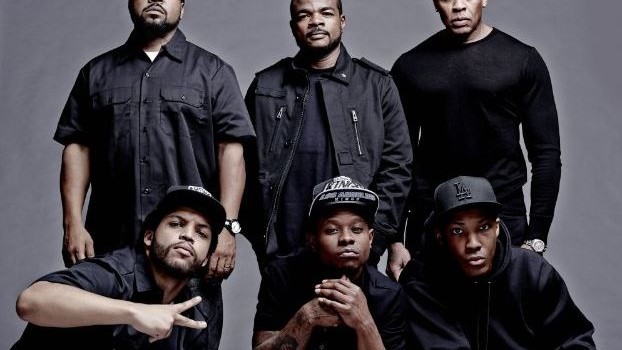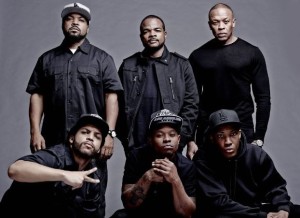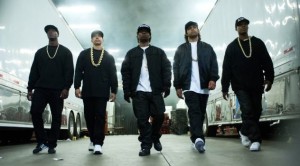Straight Outta Compton director F. Gary Gray and producer Ice Cube had their cast go through the wringer to not only get into character for their roles, but to get firmly into the mindset to play the members of N.W.A., aka the world’s most dangerous group.
“It was really, really hard. I had these guys go in the gym — some had to lose weight, some had to gain weight. They went through DJ school,” Gray told The Movie Mensch.
They even had to literally recreate history. “These guys recorded Straight Outta Compton. I had them record the entire album in eight weeks where they worked around the clock. They worked with Doug C, who was William Calhoun, where I got my start, He worked with them how to perform on stage — how to walk, talk and absorb the West Coast hip-hop culture. It’s a great feat what these guys did. These guys gave a world-class performance.”
Cube was one fifth of the group that helped put hip hop on the map and in the decades since has defined what it means to be hip hop royalty. The rapper, who also has had quite the career in Hollywood, had the added pressure of not only being a producer on Straight Outta Compton (one of our August must-see movies), but also getting his son O’Shea Jackson Jr. To play him in the biopic.
“I just want to give him all the ammunition he’d need to let him know what I was thinking of everybody at the time. From (manager) Jerry Heller to Eazy-E, so if he did ad-lib or go off script, he’d have the ammunition to address this one or that one and just how to be in the scene,” Cube said.
“I knew Gary wouldn’t go for anybody being a mimic so all I knew was I could fill him up with information and let him do his thing.”
Straight Outta Compton tells the story of how five friends came together in the mid-to-late ’80s and made history. Not only did they capture what life was like on the streets of south Los Angeles at the time, but managed to speak to it in a manner that transcended race and had them appeal to audiences of all kinds. The film shows the triumphs, and also the tragedies, that would define these men that changed the world.
When it came to filming the movie, several parts hit a little too close to home for Cube and other members of the real life crew. “In putting the movie together, me and Gary were editing the movie, going back and forth. I’d find myself tearing up, welling up — emotional in a lot of areas,” Cube said.
“Dre’s brother dying and the reaction of the group was pretty hard. Seeing Eazy get cornered in the studio was kind of rough. The hospital (where Eazy-E was dying) was real rough for me. We had to walk out a few times.”
Gray reported that he knew that hospital bed scene with Eazy-E would be tough on all those involved. There’s a volatile history there, but the undercurrent of shared friendship never waned and it came to the forefront when they were filming those emotional scenes, especially for the actors charged with capturing it on film.
“That was an amazing moment for the cast. We really set out for them to have an organic bond in rehearsals. When we shot that scene, Neil (Brown, Jr.), who plays Yella, saw him in bed, couldn’t finish the scene because he couldn’t see Jason (Mitchell, who plays Eazy-E) like that,” Gray said.
“His performance was so realistic. Part of the reason we chose Jason was because of his background — he had heart and street credibility. I knew when he performed that scene he tapped into the moment on the street for real. I cried when he did it! They’ve tapped into what’s real.”
One of N.W.A.’s most powerful anthems is F the Police and how it comes to be is one of the highlights of the film. What else is fascinating is how Gray captures not only the moment that inspired that song that would become a rallying cry for a people, but how it was not simply one moment crafted in a societal vacuum.
“What we wanted to show in the movie was the humiliation that we faced. We wanted the audience to face, ‘What if this was happening to you?’ That is the real issue. We understand the cops have to be a little heavy-handed with criminals, but we don’t understand why they gotta be that way with citizens,” Cube said.
“That’s why we did these songs. It wasn’t because we don’t like the police. If someone breaks into my house, I’m calling the goddamn police! We understand that. It’s just like don’t do the citizens this way — that’s what’s got to stop. We [Gray and Cube] were both anal about how we were gonna deal with the issues that forged our protests.”
Gray admitted that he and Cube painstakingly went over the script to ensure that they captured the feelings and landscape that produced songs like F the Police.
“The reasons were there. It was important to understand why a sixteen-year-old would write these lyrics — the social backdrop. NWA stepped out and shined a light — pre-internet, pre-camera phone — on excessive force with law enforcement,” Gray said.
“I’m actually optimistic. There’s no way that you watch these videos and not understand that change is coming. That pressure is being put on our leaders. They are in the spotlight. It’s not just about protests now — it’s about solutions. I think that’s a great direction to go in.”



